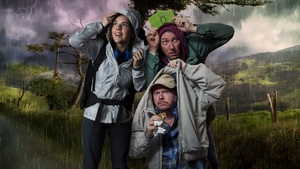In the organizer's words:
by Christoph Marthaler with texts by Friedrich Hölderlin
Director: Christoph Marthaler
Co-production with the Schauspielhaus Zürich and the Akademie der Künste Berlin
funded by the Capital Cultural Fund
"What was I like? Wasn't I like a torn string? I still sounded a little, but they were death notes."
Hölderlin, "Hyperion"
Alongside the poetic genius and the madman, there is also an almost everyday Hölderlin, who struggles with the contradictions of existence, who does not have his life under control and in his despair puts things down on paper that appeal to us and captivate us in their simple, if sometimes paradoxical, simplicity in an almost self-evident way. No high tone, no homage to ancient Greece and its gods and heroes, but profane suffering, helplessness and overexertion are then his themes, bleak, full of self-doubt and disgusted by the dull conditions and dull fellow human beings and the realization that he himself is not necessarily any better. On the B side of life, Hölderlin experiences, for example, that a young lady (not Diotima) refuses to marry him. He immediately notes this on the same page on which he has just drafted one of his most important hymns ("Mnemosyne"): "Und ledig soll ich bleiben" (And I shall remain single), and immediately follows it with a small threat to the unwilling woman: "Leicht fangent aber sich, in der Kette, die es abissen, das Kälblein." (But the calf is easily caught in the chain that it tore off).
Or against the poet's not unknown euphoria, the danger of taking off and losing the ground beneath his feet, he writes: "You can also fall into the heights, just as you can into the depths", namely when you lose the sobriety that marks the "limit of your enthusiasm" for everyone in different ways. Hölderlin's work, at least from 1794 onwards, also deals intensively with profane questions of life that tormented him personally. He was not only the heroically suffering poet, he was also simply a poor creature who suffered "because a dream did not come true for me" and who asked himself "what has failed me?". Hölderlin knew that his odes, hymns and songs were very serious, but not that serious. In any case, life itself was much more serious than his perfectly successful poems such as "Half of Life". And his poetic talent was only ever a small consolation, especially when Goethe and Schiller tried to keep him down with all sorts of outrageous invectives in concerted action, whereby they recognized him as a serious competitor, but were also involved in his social and economic ruin, which he owed mainly to his "stingy" mother, who kept him away from the inheritance he was actually entitled to. Even when he moved to Bad Homburg to live with his best friend Isaac von Sinclair after his dismissal from the Gontard banking house in Frankfurt and the associated separation from his lover, he found that he had to share his supposedly pure and exclusive affection, which had strong homoerotic traits, with a whole bunch of "conspicuous figures" that Sinclair (Alabanda in "Hyperion") had long concealed from him. "I felt like a bride when she learns that her lover is secretly living with a prostitute."
The B-side of life always produces unexpected highlights. This can be seen in the music industry, where the real masterpieces are often to be found on the B-side, and also with Hölderlin, who wrote that the "truest truth" also includes error. And who also conceded a legitimate place to the "inferior" and even the "barbaric", at least in the language of poetry, which was simultaneously repugnant to him. "I can no longer bear my language, I would rather be a sound, in the song of heaven."
In Christoph Marthaler's contemplation of Hölderlin, "Die Sorglosschlafenden, die Frischaufgeblühten" (The Carefree Sleepers, the Freshly Blossomed) move in profane failure, in small and large failures, but also in brain-wrenching mental efforts, to which no paradox is alien, bravely, devotedly and disappearing, transitioning into sounds, into music. They seem like illustrations of the poet's laments, but they are not illustrations, they simply are. "We live down here lonely and poor, like the diamond in the shaft."
We don't need corona-induced isolation to have this present experience of social distance and isolation ourselves, we just need a little Hölderlin. Or to put it another way: the corona rules formulate an extreme that, for Hölderlin, is an unavoidable part of modern tragedy. "That is the tragedy with us, that we go away from the realm of the living, quietly wrapped in some container, not that we are consumed in flames, atoning for the flames that we were unable to tame."
I think Christoph Marthaler's friendly sarcasm and Friedrich Hölderlin's "falling into the heights" go together quite well, and a "torn string play" is also capable of beautiful tones.
Carl Hegemann
Hamburg, 29/11/2020
With: Josefine Israel, Sasha Rau, Lars Rudolph and Samuel Weiss
Director: Christoph Marthaler
Stage: Duri Bischoff
Costumes: Sara Kittelmann
Lighting: Annette ter Meulen
Idea and artistic advice: Carl Hegemann
Dramaturgy: Malte Ubenauf
Viola da gamba: Martin Zeller
Piano and clavichord: Bendix Dethleffsen
Further information: Die Sorglosschlafenden, die Frischaufgeblühten | Deutsches Schauspielhaus Hamburg
This content has been machine translated.
Location
Location | Theater















